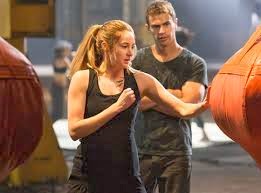 Citizenfour is the story of how Edward Snowden became the
whistleblower and/or traitor of the NSA. This documentary starts with Snowden
contacting reporters anonymously, trying to find someone he could talk to with
a safe connection. The first reporter he attempted to contact could not
establish a safe enough connection for his requirements, so he moved on to
Laura Poitras, the documentary maker.
Citizenfour is the story of how Edward Snowden became the
whistleblower and/or traitor of the NSA. This documentary starts with Snowden
contacting reporters anonymously, trying to find someone he could talk to with
a safe connection. The first reporter he attempted to contact could not
establish a safe enough connection for his requirements, so he moved on to
Laura Poitras, the documentary maker.
Laura Poistras had made an earlier documentary about life in
Iraq under U.S. occupation, and as she began her second film about the trial of
a man held at Guantanamo Bay, she began to be detained when she crossed the U.S.
border. She says she moved to Berlin to avoid having her cameras and files seized.
Her efforts to document reality and her experience with the Department of
Homeland Security led Snowden to believe that she would be willing to listen.
The most interesting aspect of this film is that it shows a
sort of history in the making. The then 29-year-old Snowden made big headlines
as he leaked the enormity of the NSA’s surveillance of world leaders as well as
more average U.S. citizens. Viewers find a likeable enough young man who spends
8 days in a room at the Mira hotel in Hong Kong as reporters ask him questions
and verify what he is saying, writing up stories on different aspects of his
information as they continue to interview him.
Citizenfour is a very quiet movie, sticking to the hotel room and talking heads for the most part. At times, you see signs of an idealistic young man who is horrified
at what his own government is doing under the banner of protecting the
homeland and who is worried about the effect this will have on his family. On the other hand, there are times that you wonder whether he has
crossed over the line into mental illness, as his paranoia about the reach of
surveillance leads him to do things like put a blanket over his head when he
types his passcode into the computer.
He certainly seems to enjoy the prospect of being someone who is making a big play; he looks forward to seeing how the world reacts.
I'm not much for conspiracy theories. For the most part though, his story seems very credible, and
it is astonishing to think about how much information the US collects, how
government officials may have lied under testimony about what they are up to,
how much money they spend on facilities to accomplish their surveillance, and
how little privacy we have left.
As frightening as it is to think that our own government is
spying on us, then comes the news about North Korea’s involvement in getting a
big-budget movie scuttled because they were unhappy with the storyline. I might
not be the biggest proponent of ridiculous comedy efforts like The Interview, but I am a proponent of
free speech and thought. In both the documentary and in the controversy
surrounding Sony’s withdrawal of The
Interview from theaters, the “chilling effect” of governments acting as
thought police comes up again and again.
I would welcome anyone else's thoughts on the Snowden events and/or the movie. This documentary is an important one as we consider the
freedoms that we enjoy and the potential for losing them.












